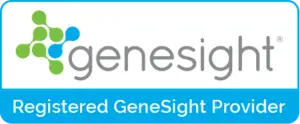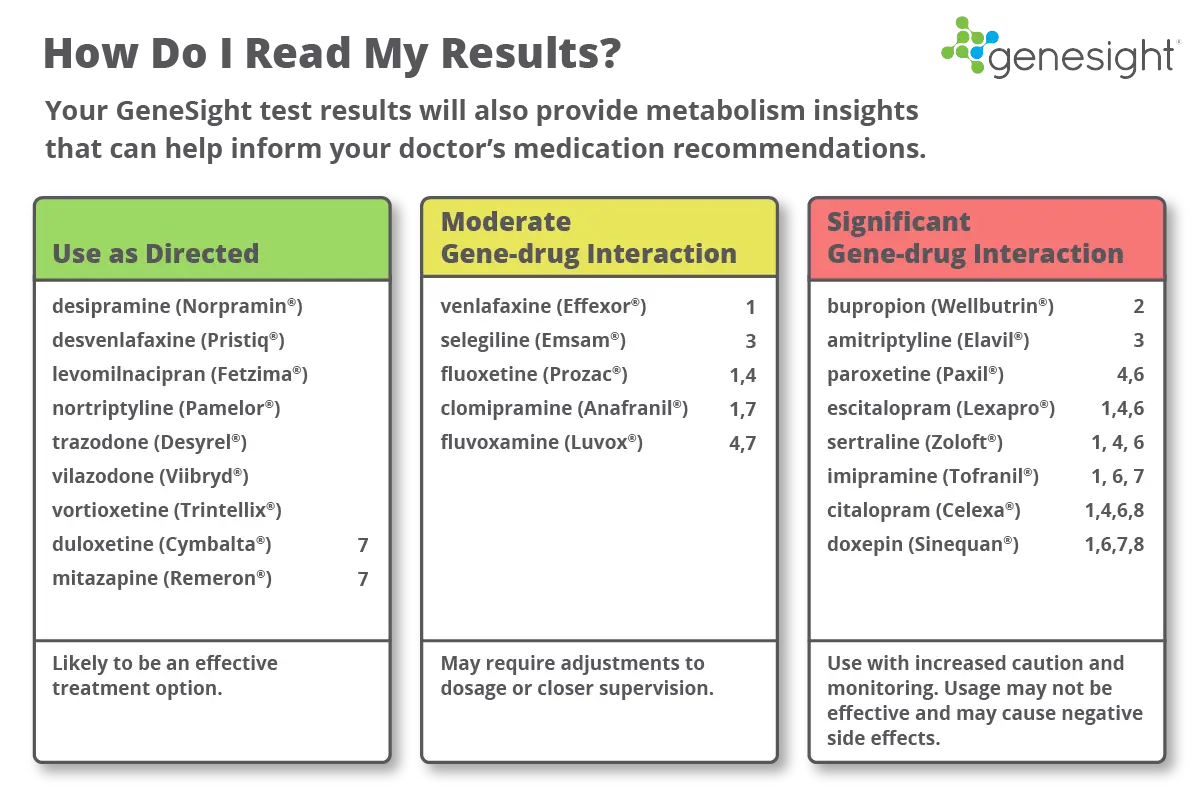

Dr. Rostislav Ignatov, MD
Chief Medical Officer
Finding the right mental health medication can feel like a guessing game. For many people, it takes trying several different drugs, dealing with side effects, and waiting weeks or months to see if anything works. But what if there was a smarter way?
That’s where GeneSight comes in.
GeneSight is a genetic test that helps doctors choose medications based on your DNA. By understanding how your body processes certain drugs, GeneSight gives healthcare providers key information to help pick medical treatment medications that are more likely to work well and less likely to cause side effects.
Let’s explore what GeneSight does, what medications GeneSight tests for, and how it could make your mental health journey easier and more effective.
GeneSight is a type of pharmacogenomic test. That means it looks at how your genes affect the way you respond to medications. The test is quick and non-invasive. It only requires a simple cheek swab, which is then analyzed in a lab to detect genetic variations.
These small variations in your DNA can make a big difference in how your body breaks down medical treatment medications, how effective they are, and what side effects you may experience. Some people metabolize drugs too quickly, others too slowly. Some people may not tolerate certain medications at all. GeneSight helps reveal that.
With these insights, your doctor can avoid the trial-and-error method and instead focus on medications more likely to be a good match for your biology.

GeneSight analyzes your genes against more than 60 commonly prescribed psychiatric medications, including treatments for depression, anxiety, ADHD, bipolar disorder, and other mental health conditions. Wondering what specific medications GeneSight tests for?
Here’s a breakdown of the main categories:
Antidepressants treat depression, anxiety, and other mood disorders—but they don’t work the same for everyone. GeneSight tests for several different types:
SSRIs (Selective Serotonin Reuptake Inhibitors):
SNRIs (Serotonin and Norepinephrine Reuptake Inhibitors):
Tricyclic Antidepressants (TCAs):
Atypical Antidepressants:
Each of these works differently in the brain, and your genes may influence how well you tolerate or benefit from each type.
Antipsychotic medications are often used to treat schizophrenia, bipolar disorder, and treatment-resistant depression. They can also help with severe mood swings or hallucinations. GeneSight tests for several common options, including:
Because antipsychotics can come with serious side effects—like weight gain or movement disorders—using genetic testing to guide their use is especially important.
Some medications focus on relieving anxiety or helping with sleep. These are usually short-term treatments but can be essential in managing symptoms:
GeneSight helps predict how your body might react to these medications, which is valuable since they can be habit-forming or sedating.
Mood stabilizers are most commonly used in bipolar disorder to help even out extreme highs and lows. GeneSight tests for:
Not everyone responds the same to these treatments, and some require close monitoring. Genetic insights help make those decisions safer and more personalized.
Attention-deficit/hyperactivity disorder (ADHD) can be treated with both stimulant and non-stimulant medications.
This is especially helpful for parents and adults trying to understand what medications GeneSight tests for when exploring ADHD treatment options. GeneSight tests for both:
Stimulants:
Non-stimulants:
Finding the right ADHD medication often requires trying several options. GeneSight can shorten this process.
Once the lab processes your DNA sample, GeneSight provides a report that places each medication into one of three color-coded categories:
🟢 Green: Use as directed – likely to be an effective treatment option
🟡 Yellow: Use with caution – may require adjustments to dosage or closer supervision
🔴 Red: Use with increased caution and monitoring – usage may not be effective and may cause negative side effects

Your GeneSight test results will also provide insights on your metabolism that can help inform your doctor’s medication and dosage recommendations.
For each medication, the test results tell you whether you process it too fast or too slow and how that may affect the dosage you need.
GeneSight is designed to support—not replace—clinical judgment. Providers use the report alongside your symptoms, history, and other medical factors to guide the most effective treatment plan.
GeneSight gives both patients and providers a clearer path forward in mental health treatment. Here are a few key benefits:
Fewer Side Effects
GeneSight helps doctors skip medications that your body may not process well, reducing the risk of common side effects like nausea, weight gain, or drowsiness.
Faster Relief
Instead of spending months trying different drugs, you may find a good fit sooner, with faster improvements in mood, energy, and focus.
Fewer Medication Changes
With targeted recommendations, you’re less likely to need frequent medication changes, dosage tweaks, or frustrating backtracking.
While GeneSight is a powerful tool, it’s important to remember a few key points:
It’s Not a Magic Bullet
GeneSight doesn’t guarantee results. Psychiatric treatment is complex and based on more than just genes. Your doctor will also consider your personal history, current symptoms, and lifestyle.
Cost and Insurance Coverage
GeneSight is often covered by insurance. Medicare and Medicaid fully cover it, and many private insurers provide full or partial coverage.
If you do pay out-of-pocket, the costs are usually reasonable and the value of faster, more effective treatment may outweigh the expense.
Your Data Is Protected
GeneSight follows HIPAA privacy laws to keep your genetic information safe. Your results are encrypted and shared only with your medical team.
You’re also protected under the Genetic Information Nondiscrimination Act (GINA), which means your genetic data can’t be used against you by health insurers or employers.
At The Haven Detox, we’re committed to using the best tools available to support your recovery. Mental health and addiction treatment aren’t one-size-fits-all, and GeneSight helps us personalize your care.
Whether you’re facing depression, anxiety, substance use, or all three, GeneSight helps us tailor a treatment plan from day one. At The Haven Detox, we combine this insight with proven therapies, 24/7 care, and a medical team focused on your recovery.
If you’re still unsure what medications GeneSight tests for—or whether it could help in your recovery—our team can walk you through the process and answer your questions.
Get answers about your cost / coverage now.
Your information will be kept private
Let’s talk about what’s going on — no judgment. (We’ve been there before ourselves). No one will know you inquired and there is no commitment to call.
24/7 Support
No Commitment
100% Private
There’s no catch. Checking your insurance is simply a way to see what your plan covers — it doesn’t lock you into treatment, notify anyone, or cost you anything. You get answers upfront to decide what makes sense for you.
Protecting your privacy matters! No information or notifications are ever sent to your employer or family — whether you check your insurance online or call. Everything is handled through secure, encrypted systems that meet strict medical privacy laws. You stay in control of your information!
Luckily, most insurance policies cover treatment here. Depending on the healthcare you’ve already had this year, costs could even be zero. Instead of worrying, let’s just find out what your plan covers.
Most likely. We work with major providers like Cigna, Aetna, and United Healthcare, public insurances like Tricare and tribal plans, and even smaller plans like Surest Bind and Harvard Pilgrim. The quickest way to know for sure is to check online or call. It’s a quick, private way to understand what is covered upfront.
Verifying your insurance isn’t a commitment to start treatment — it’s simply a way to see what your options are. Knowing your coverage ahead of time helps you make more informed, confident decisions. It also helps flag a spot, so you’re able to get right in if you ever do decide you’re ready.
You need your policy number to check your specific policy online. If you want general information, just call. You likely have questions beyond insurance anyway. Reaching out now helps you figure out the right fit if or when you’re ready. You don’t have to put off the call until you’re in crisis. Calling is not scary, I promise!